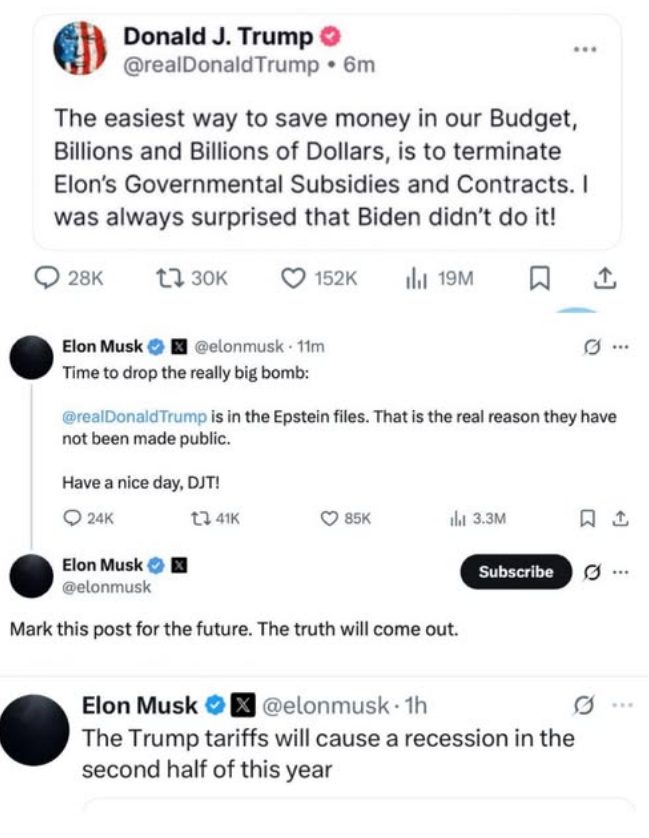In a dramatic twist that has shocked the MAGA movement as well as other politicians, the aerospace industry, and in general everyone that believed in the partnership, Elon Musk announced on Twitter that SpaceX will begin decommissioning its Dragon spacecraft “immediately” in response to a statement by former U.S. President Donald Trump calling for the cancellation of Musk’s government contracts.
The social media clash began when Trump posted on Truth Social that “The easiest way to save money in our Budget, Billions and Billions of Dollars, is to terminate Elon’s Governmental Subsidies and Contracts. I was always surprised that Biden didn’t do it!”
Just minutes later, Musk responded publicly, stating:
“In light of the President’s statement about cancellation of my government contracts, @SpaceX will begin decommissioning its Dragon spacecraft immediately.”
The Dragon spacecraft has been a central component of NASA’s Commercial Crew and Commercial Resupply Services programmes, successfully ferrying astronauts and cargo to the International Space Station (ISS). The announcement, if taken at face value, could signal a seismic shift in U.S. space policy and public-private cooperation in orbit.
Is Musk Serious?
While it’s unclear whether Musk’s tweet represents an actual operational decision or a calculated political move, the statement reflects growing tensions between the billionaire entrepreneur and the political establishment. Musk has long positioned himself as both an innovator and a provocateur. His companies, from Tesla to SpaceX, have received significant public funding and government contracts, while Musk himself frequently challenges state intervention and policy direction.
Implications for Space Policy & National Security
Should SpaceX truly begin winding down Dragon operations, it would jeopardise one of NASA’s most critical crew transport systems. Boeing’s Starliner has faced repeated delays and setbacks, leaving Dragon as the main U.S.-based alternative to Russian Soyuz capsules for astronaut transportation.
Trump’s statement also raises broader questions about political influence on science and defence infrastructure. Cancelling SpaceX contracts could affect military satellite launches, lunar ambitions under Artemis, and international collaborations involving NASA and SpaceX.
NASA has invested billions into the Commercial Crew Program, with SpaceX’s Dragon capsule being the most successful outcome. If Dragon were to be decommissioned, NASA would either have to increase reliance on Boeing’s Starliner, which has been plagued by delays and budget overruns or return to purchasing seats on Russian Soyuz launches, which previously cost upwards of $80 million per seat. This is far more than what NASA pays SpaceX. All this would increase taxpayer costs substantially and slow down American-led manned space missions.
This controversy comes at a time when Trump is seeking to regain political traction ahead of the 2024 election, and Musk continues to assert influence through platforms like X. Both figures have built their public personas on disruption. But their clash now pits technological ambition against political populism.
Other Financial Implications
SpaceX is not just a contractor. It’s also a market bellwether. If it were to scale back government-facing operations, investors might interpret it as regulatory instability and reassess risk exposure to the aerospace sector. Venture capital and private equity funding in space startups could become more conservative, leading to reduced innovation pipelines.
Other companies dependent on NASA contracts could see stock volatility or reduced valuations, especially if the market expects broader contract reviews or political retaliation.
The financial loss here is not just operational but also reputational in that partners may begin to question the U.S. government’s stability and reliability in aerospace collaborations. Additionally, tourism companies like Axiom Space and research payload companies that rely on SpaceX might lose their launch windows or face higher costs elsewhere.
Musk decommissioning SpaceX Dragon could have knock-on effects on supply chains, jobs and the broader NewSpace ecosystem.
Space industry insiders will be watching closely for clarification. Will SpaceX formally withdraw from contracts with NASA and the Department of Defense? Or is this a high-stakes manoeuvre in a longer political game?
Either way, the standoff shows that even the space industry is no longer immune from the volatile dynamics of modern American politics. These days a single post can threaten to send billion-dollar spacecraft into retirement.
Author Profile

- Ex-community moderator of the Banano memecoin. I have since been involved with numerous cryptocurrencies, NFT projects and DeFi organizations. I write about crypto mainly.
Latest entries
- June 6, 2025NewsWireElon Musk to Decommission SpaceX Dragon after Trump Threat
- December 9, 2024Stock MarketMaster the Time Value of Money Financial Concept
- November 18, 2024Stock MarketFinancial Ratios Guide to Measuring Business Performance
- November 11, 2024NewsWireLabour’s UK Budget: A Fiscal Smirk of Contempt for Working People






